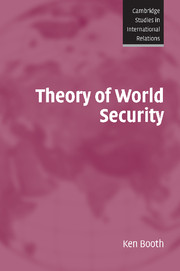Book contents
4 - Deepening, broadening, reconstructing
Published online by Cambridge University Press: 05 June 2012
Summary
if I am not in favour of the abstract, with what am I to control the concrete? if I am not in possession of the concrete, with what am I to control the abstract?
Juan Gris, 1971 gallery catalogueThis chapter is best considered as a long footnote to the conceptualisation of security developed in chapter 3, when important issues were left hanging in the air. The present discussion begins by focusing on ‘deepening’ and ‘broadening’ security, claiming that security in the political realm is above all a derivative concept, and suggesting what this means in relation to international agendas. Deepening and broadening are often misunderstood, as will be explained. Of the two, the most basic move is deepening, because it is only through an understanding of the assumptions on which a conception of security rests that broadening in its name can be appreciated. Deepening, in other words, reveals the political theory in which conceptions of security are anchored, and so the priorities that will shape the associated political agenda. By uniting security with political theory, the deepening move also provides a basis for a synthesis of critique and reconstruction – the process of creating a politics of emancipation.
Security as a derivative concept
questions about security cannot be separated from the most basic questions of political theory.
R. B. J. Walker in ‘The Subject of Security’Central to the task of exploring the theory and practice of security is what for many years I have called ‘deepening’: the idea that security in world politics is essentially a derivative concept.
- Type
- Chapter
- Information
- Theory of World Security , pp. 149 - 181Publisher: Cambridge University PressPrint publication year: 2007

